Another wet afternoon and evening meant a paucity of moths in the trap. A large nutmeg was new for the year on the macro front whilst other macros were common swift, light emerald, green carpet and heart and dart.
A new micro for me was a Pseudargyrotoza conwagana shown below as well as the common grass moth Crambus lathoneillus
A record of the wildlife in and around Hadham Ford as from January 2008. Please feel free to leave any comments or email me with details of interesting bird, mammal, butterfly, moth and dragonfly sightings. @jonoForgham on twitter
Thursday 29 May 2014
Lakenheath RSPB and Weeting Heath
A leisurely morning checking moths before a drive to Lakenheath RSPB reserve on the Norfolk border. Very overcast and consequently terrible light for photographs. Most birds were just too far away for a worthwhile shot, which is a shame as I saw some good birds.
Sedge and reed warblers were both in good voice all over the reserve with several showing well, but even close the light was poor.
I wandered along the riverbank to the hide overlooking the main reedbed. On the river and lake beyond were great crested grebes, a few common terns, coots, mallards and mute swans. A duck flew past, a garganey and I managed just one shot of it.
In the far distance I noted 2 common cranes in the field and overhead hobbies were chasing swifts and martins. A few shoveler went by as I came across several species of dragon and damselflies. Plenty of 4 spot chasers that wouldn't pose for a photo whilst these did.
Cuckoos were calling all over the reserve, probably at least 5 with a female flying into the poplars where golden oriole are often heard and not seen. However, so far this year, none have arrived at what is usually a good spot for them.
Checking a nettle patch close to the path I encountered this drinker moth caterpillar. This is standard food for the cuckoos.
After a wander around the poplars where willow warblers, chiffchaffs and balckcaps were calling, I had a coffee at the visitors' centre before heading off to Weeting Heath some 4 miles away. Finally, Lakenheath can be very peaceful, but occasionally, certainly not and this morning was one of the noisy sessions as shown here.
Upon arriving at Weeting Heath I headed for the east hide. Plenty of corvids, lapwings and rabbits but no sign of a stone curlew, so round to the west hide, where 4 were showing very distantly. At one point I got a great show of "mantling" from one bird protecting its nest as a stoat made its way across the heath.
This shot was taken but really, too poor for publication, just to show the unpleasant conditions.
I crossed the road for the woodland trail. As I did so, the reported turtle dove flew overhead and was gone before I could focus the camera. I could hear curlews somewhere on the heath as well as more warblers, goldcrest and treecreepers. At the top of Track 49 the forest peters out and there is some heathland. Here, several skylark were in good voice and then 2 woodlark, short tailed and with no white upon the tail, flew past. I hoped they'd land on the fenceposts for a photo but they went straight into the long grass, not to re-emerge. As I walked back down to the carpark 2 shelduck flew south, probably the oddest record I have had at this site.
All in all a worthwhile few hours with the following year listers;
hobby, common crane, turtle dove, stone curlew and woodlark, taking my year list to 157 species. Some way off last year's total at this point but, hopefully, Norfolk next Friday should extend the list considerably.
Sedge and reed warblers were both in good voice all over the reserve with several showing well, but even close the light was poor.
 |
| reed warbler |
 |
| sedge warbler |
 |
| garganey |
 |
| common tern returning to nest with fish |
 |
| Azure damselfly |
 |
| female azure damselfly |
Checking a nettle patch close to the path I encountered this drinker moth caterpillar. This is standard food for the cuckoos.
After a wander around the poplars where willow warblers, chiffchaffs and balckcaps were calling, I had a coffee at the visitors' centre before heading off to Weeting Heath some 4 miles away. Finally, Lakenheath can be very peaceful, but occasionally, certainly not and this morning was one of the noisy sessions as shown here.
 |
| from Lakenheath or Mildenhall USAF BASE |
This shot was taken but really, too poor for publication, just to show the unpleasant conditions.
 |
| stone curlew |
All in all a worthwhile few hours with the following year listers;
hobby, common crane, turtle dove, stone curlew and woodlark, taking my year list to 157 species. Some way off last year's total at this point but, hopefully, Norfolk next Friday should extend the list considerably.
Wednesday 28 May 2014
Evening wander 28.05.14
An hour wandering around Hadham Hall, firstly, to check on the barn owl pair nearby and also to listen for any newly arrived migrants. Not 2 minutes after leaving the car, I heard and then saw, a spotted flycatcher. This site is one that has had successful breeding in the past, but tonight, I only observed a single male flitting about. It gave the impression of a newly arrived as it didn't seem to have established a feeding post or two. Very busy moving about through the trees. Great record for Herts. all the same. Hopefully, the female will arrive over the next few days.
As I wandered around the back of the pond, my attention was drawn to something small moving about in the undergrowth: a juvenile wren, still with the yellow gape on the beak. Constantly on the move, I changed the camera speed and settings to compensate for poor light.
After this I got on to the farm track that leads to where barn owls can be seen. Almost immediately I had distant views of one hunting, looking very white from such a distance, hence their local name; ghost owl.
I wanted to discover whether both adults were hunting and, if so, were they returning to the nest hole with food as this would indicate youngsters. In the 45 minutes I was present, I noted a second one leave the hole, but this could have been the first after returning. I waited for a while but none returned. I shall pop back to check when I have more time. However, the fact that they possibly both out hunting may mean young, albeit rather late in the year.
On the lake were 5 tufted duck and a grey heron. Overhead were skylarks, chaffinches, pied wagtails, linnets and swallows, plus a solitary swift. Both green and great spotted woodpeckers were seen and a reed bunting was heard alongside a yellowhammer. A peaceful hour's walk.
.JPG) |
| first shot of spotted flycatcher in poor light |
.JPG) |
| Closer view at what might be it's feeding station |
As I wandered around the back of the pond, my attention was drawn to something small moving about in the undergrowth: a juvenile wren, still with the yellow gape on the beak. Constantly on the move, I changed the camera speed and settings to compensate for poor light.
After this I got on to the farm track that leads to where barn owls can be seen. Almost immediately I had distant views of one hunting, looking very white from such a distance, hence their local name; ghost owl.
I wanted to discover whether both adults were hunting and, if so, were they returning to the nest hole with food as this would indicate youngsters. In the 45 minutes I was present, I noted a second one leave the hole, but this could have been the first after returning. I waited for a while but none returned. I shall pop back to check when I have more time. However, the fact that they possibly both out hunting may mean young, albeit rather late in the year.
On the lake were 5 tufted duck and a grey heron. Overhead were skylarks, chaffinches, pied wagtails, linnets and swallows, plus a solitary swift. Both green and great spotted woodpeckers were seen and a reed bunting was heard alongside a yellowhammer. A peaceful hour's walk.
Quieter moth night
After continual drizzle, intermingled with heavier downpours, I wasn't too expectant upon arriving at the trap this morning. However, I was pleasantly surprised and the early rise proved to be worth it.
A brown rustic was the only new for year moth, but also, 2 treble lines,2 buff ermines and singles of mottled rustic, heart and dart and common swift.
A brown rustic was the only new for year moth, but also, 2 treble lines,2 buff ermines and singles of mottled rustic, heart and dart and common swift.
 |
| brown rustic |
Tuesday 27 May 2014
And the moths keep coming
After a 3 day lay off from the moth trap due to absence, this morning was worth getting up for early and closing the trap in heavy rain. I returned later in the morning to find 16 moths of 12 species present. Not too bad considering it had been a chilly and wet night. New for the year were latticed heath (common), light brocade (several records) and a small angleshades (2nd garden record)
Apart from these, the numbers were made up with several regular species such as green carpet, treble lines, poplar hawkmoth, white ermine, common pug, rustic shoulder-knot, clouded silver, pale tussock, and Udea olivalis
Apart from these, the numbers were made up with several regular species such as green carpet, treble lines, poplar hawkmoth, white ermine, common pug, rustic shoulder-knot, clouded silver, pale tussock, and Udea olivalis
 |
| light brocade, slightly worn specimen |
.JPG) |
| small angle shades in good condition |
.JPG) |
| small angle shades in profile |
Monday 26 May 2014
Brief Hadham Hall wander
A check on things to the east of the parish this morning. As expected, after rainfall, not too much on offer. At the irrigation lagoon the regular barn owl, a pied wagtail, yellowhammers, linnets and swallows as well as 2 grey herons.
A few damselfies, teneral common blues were on the wing, but no hoped for early emperor dragonflies. Need more sun. The breeding coots at Hadham Hall still have 5 of their young in tow, shown below. Not really warm enough for butterflies, just caterpillars of the peacock butterfly found on nettles.
A few damselfies, teneral common blues were on the wing, but no hoped for early emperor dragonflies. Need more sun. The breeding coots at Hadham Hall still have 5 of their young in tow, shown below. Not really warm enough for butterflies, just caterpillars of the peacock butterfly found on nettles.
 |
| coot and juvenile |
 |
| peacock butterfly caterpillars |
 |
| barn owl |
 |
| grey heron |
 |
| recently emerged common blue damselfly |
Updated year list 26.05.14
Very slow building my list of late. Trip to Poland added plenty, but not to my UK year list. Consequently, only been birding in the parish and therefore just added a few new ones. Trip to North Norfolk/Suffolk on Friday 6th June should build up the list considerably.
143: Garden warbler
144: cuckoo
145: house martin
146: swift
147: stonechat
148: rock pipit
149: red breasted merganser
150: lesser whitethroat.
151: common tern
152: spotted flycatcher
153: common tern
154: turtle dove
155: hobby
156: crane
157: woodlark
143: Garden warbler
144: cuckoo
145: house martin
146: swift
147: stonechat
148: rock pipit
149: red breasted merganser
150: lesser whitethroat.
151: common tern
152: spotted flycatcher
153: common tern
154: turtle dove
155: hobby
156: crane
157: woodlark
 |
| Archive 2011; juvenile bee eater, The Camargue August |
Thursday 22 May 2014
More new moths
Wednesday 21 May 2014
Another good moth night
Again, a reasonable haul of late May moths, with scorched wing, oak hooktip, willow beauty, light emerald, common swift, heart and dart, white spotted pug, treble lines, mottled rustic and udea olivalis all being new for the year.
In all, 21 species of 31 moths. Hopefully more of the same tonight before the forecast heavy rainstorm.
In all, 21 species of 31 moths. Hopefully more of the same tonight before the forecast heavy rainstorm.
 |
| common swift |
 |
| 2nd garden record of oak hooktip |
 |
| rustic shoulder-knot |
 |
| scorched wing |
 |
| treble lines |
Quiet village wander
Another walk back from town via Cradle End, Bury Green and the polo fields was rather uneventful. Plenty of regular warblers singing on their territory and loads of family parties of long tailed tits. A surprise at Bury Green, a fly over cormorant, but apart from that, just common blue and speckled wood butterflies made it on to the list.
A green woodpecker called from a house roof, not a usual site for this bird, but I returned to sort out the night's moth catch.
A green woodpecker called from a house roof, not a usual site for this bird, but I returned to sort out the night's moth catch.
 |
| common blue |
 |
| long tailed tit |
 |
| Bury Green long tailed tit |
 |
| speckled wood |
 |
| female green woodpecker |
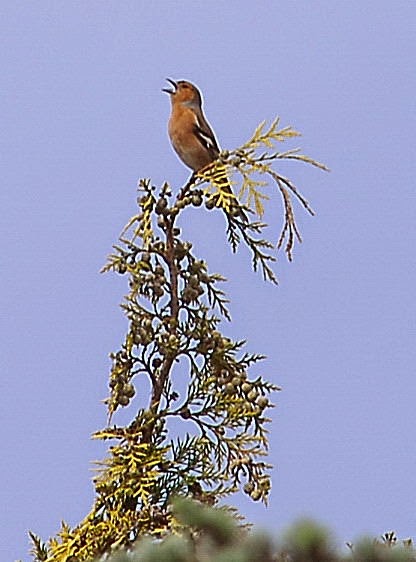 |
| singing chaffinch at the village war memorial |
Tuesday 20 May 2014
Increased moth Activity
A super night mothing last night. Firstly, having set up the garden trap, I went out for a wander at 10.30pm with net and bright head torch, netting several common species such as green carpet, silver ground carpet, chinese character and rustic shoulder-knot. Returning to the garden at 11.30, it was clear I was in for a busy session with plenty of activity in and around the 125 watt lamp.
This morning, I was up early to check the contents and the results were by far and away the best so far this year.
In all 24 species were taken combined and in total 38 moths. Just for this record occasion I shall list all species.
Macros:
Flame shoulder 2
Green carpet 3
Chinese character
Silver ground carpet
Common marbled carpet
Brimstone
Pale tussock
Mottled pug 6
White ermine
Common white wave (new for year 48th species)
common pug 3
Poplar hawkmoth
Shuttle shaped dart
marbled minor complex 4 (49th species NFY)
Waved umber
V pug (NFY 50th species)
Brindled pug
Micros:
Bee moth
Emmelina monodactyla 2
Eulia ministrana 2 (new moth for me 14th micro of year)
Epiphyas postvittana (15th micro for year)
Agonopterix subpropinquella (16th micro NFY)
Celypha lacunana (17th micro NFY)
Syndemis musculana
Also in the trap was this magnificently names bug of the hemiptera order Dryophilocoris flavoquadrimaculatus !! At about 6mm in length it's name is far longer than the creature itself.
Finally, as I was checking the trap, I left the patio door open and, upon returning, found a great tit perched on my birdwatching scope in the lounge!!
This morning, I was up early to check the contents and the results were by far and away the best so far this year.
In all 24 species were taken combined and in total 38 moths. Just for this record occasion I shall list all species.
Macros:
Flame shoulder 2
Green carpet 3
Chinese character
Silver ground carpet
Common marbled carpet
Brimstone
Pale tussock
Mottled pug 6
White ermine
Common white wave (new for year 48th species)
common pug 3
Poplar hawkmoth
Shuttle shaped dart
marbled minor complex 4 (49th species NFY)
Waved umber
V pug (NFY 50th species)
Brindled pug
Micros:
Bee moth
Emmelina monodactyla 2
Eulia ministrana 2 (new moth for me 14th micro of year)
Epiphyas postvittana (15th micro for year)
Agonopterix subpropinquella (16th micro NFY)
Celypha lacunana (17th micro NFY)
Syndemis musculana
.JPG) |
| Ag subpropinquella |
.JPG) |
| Celypha lacunana |
.JPG) |
| common marbled carpet |
 |
| underwing shot of common marbled carpet |
.JPG) |
| Eulia ministrana |
 |
| Syndemis musculana |
 |
| V pug |
Finally, as I was checking the trap, I left the patio door open and, upon returning, found a great tit perched on my birdwatching scope in the lounge!!
Subscribe to:
Posts (Atom)
This is me

At the end of another Norfolk Coastal footpath walk. 47 miles, 3 days 99 species of bird. September 2009
Caley Wood view

sunshine through the canopy 29.05.08
A walk along the Warta Valley, Poznan, Poland. Feb 2007
Best birds on this walk: black and middle spotted woodpecker and short toed treecreeper
About Me
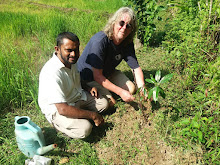
- Jono Forgham
- A primary school teacher for 30 years, I retired from teaching in July 2009 to set up my own science enhancement and communication company. The Primary Works offers science clubs, workshops and staged science shows nationwide. I have always been interested in bird watching since my early years. Apparently my first tick was after inquiring about a chaffinch and then receiving the Observer book of birds. By the age of 9 I had moved on to Tory Peterson's collins guide and was now involved on YOC birding holidays to Northumbria, Essex coast, Slimbridge and Yorkshire. My twitching rule is that I will willingly travel 1km for each gram the bird weighs. However, I have had many rarities just by being in the right place. I have travelled widely throughout Europe and also visited Australia and Sri Lanka. In 2016 I spent time at Portland Bird Obs and two trips to Aviero, Portugal. 2017 found me back in Sri Lanka in Feb/March, then July and back for New Year's Eve celebrations in December. Also returned to The Camargue in May for a 4 day trip. Few plans for 2018, but nothing yet booked apart from a trip to the IOW.
Grey heron

Over the allotment 28.09.08
Southern Hawker

Ridge footpath 27.08.08
Juvenile green woodpecker (17.08.08)

Note the stripes, denoting a bird fledged this year.
common blue

Ash Valley G.C. 15.08.08
Indian balsam (impatiens glandulifera)

River Ash
azure damselfly

River Ash 28.07.08
marbled white

Discovered at Westland Green 22.07.08
ruddy darter

Bush Wood 21.07.08
honeysuckle 19.07.08

growing in hedgerow in Chapel Lane
cinnabar moth caterpillar

Photographed on ragwort 19.07.08
Bittersweet

Study of petals 11.06.08
male yellowhammer

08.06.08
common blue butterfly

06.06.08
River Ash

looking south from the bridge at Hadham Ford
Common poppy (papaver rhoeas)

in rape field 29.05.08
Caley Wood sunshine

29.05.08
Millenium Wood fox

24.05.08
common comfrey (symphytum officinale)

06.05.08 banks of the River Ash
Garlic Mustard or Jack by the Hedge,(Alliara petiolata)

flowers, leaves and fruit edible . Good in salad and pesto
April showers

Double rainbow 30.04.08
Caley Wood bluebells

22.04.08
Yellow Archangel

Chapel Lane (20.04.08)
sunlight 16.04.08

looking south west from Bush Wood
snowy buds
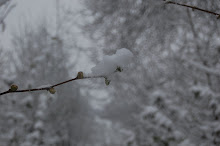
06.04.08 in Bush Wood
Looking north west

05.04.08 evening shower approaching
Back Garden

Easter Sunday (23.03.08)
Brick Kiln Hill

Looking east (23.03.08)
No play today

The 2nd hole at Ash Valley golf course
Teasel head

Bush Wood (21.03.08)
Reflections

daffodils at Bush Wood pond (21.03.08)
Swollen River Ash

The river at the bottom of Winding Hill 16.03.08
Daybreak over the chapel

Thursday 13th March
Wild daffodils (narcissus pseudonarcissus)

growing in Bush Wood
January snowdrops

Banks of River Ash, north of Much Hadham
Good Moon

From garden 24.01.08
Village Green

Looking east towards Acremore Street
Looking south before Hadham Ford

rare January blue sky
Useful sites
The following are some useful websites that may interest readers of this blog.
Firstly, Bishop's Stortford Natural History Society http://bsnhs.webplus.net/
Firstly, Bishop's Stortford Natural History Society http://bsnhs.webplus.net/
Fellow birder, Gary Whelan's blog. Gives reports from our trips out together plus reports from his trips abroad. http://hairybirders.blogspot.co.uk
http://www.hertsbirdclub.org.uk/ The official herts bird club website. Frequently updated, listing bird sightings around the county. Offers links to many other websites. Both of these sites also offer links to yahoo discussion groups.
http://www.birdforum.net/ An international site. You can enter as a guest but become a member( free) to post comments, bird sightings and just about anything to do with wild birds. Good news updates, classified section for binoculars, cameras etc.
http://www.guidedbirdwatching.com/ A new site set up where you can contact people worldwide who will help you find good birds in their country. UK section being set up presently.
http://www.britainsbirder.co.uk/
Fellow birders blog. Strtford resident, Graeme Smith regulary birds the area south of Stortford as well as around Spellbrook and the River Stort from Spellbrook to Twyford Locks. Some superb bird photography: Graeme uses a digital camera attached to his powerful telescope to get detailled images of the birds he sees. Well worth a browse.
Two local sites that may be of interest can be found at
http://www.thehadhams.com/ www.thepelhams.net/content/section/12/139/
http://www.hertsbirdclub.org.uk/ The official herts bird club website. Frequently updated, listing bird sightings around the county. Offers links to many other websites. Both of these sites also offer links to yahoo discussion groups.
http://www.birdforum.net/ An international site. You can enter as a guest but become a member( free) to post comments, bird sightings and just about anything to do with wild birds. Good news updates, classified section for binoculars, cameras etc.
http://www.guidedbirdwatching.com/ A new site set up where you can contact people worldwide who will help you find good birds in their country. UK section being set up presently.
http://www.britainsbirder.co.uk/
Fellow birders blog. Strtford resident, Graeme Smith regulary birds the area south of Stortford as well as around Spellbrook and the River Stort from Spellbrook to Twyford Locks. Some superb bird photography: Graeme uses a digital camera attached to his powerful telescope to get detailled images of the birds he sees. Well worth a browse.
Two local sites that may be of interest can be found at
http://www.thehadhams.com/ www.thepelhams.net/content/section/12/139/
South Easterly walk
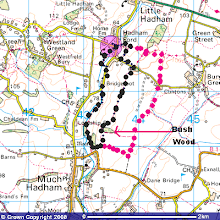
black, normal, red extended walk
South Westerly route.
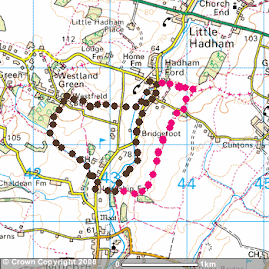
Black usual, red extended
North Easterly walk
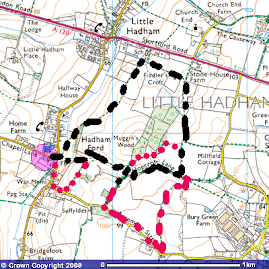
black short, walk. Red, extended
North West Patch
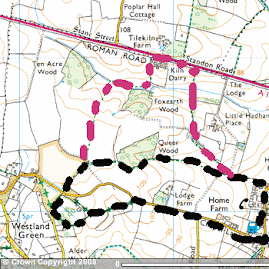
black route regular. Red route the extended wander


.JPG)
.JPG)
.JPG)

.JPG)
.JPG)
.JPG)
.JPG)




.JPG)

